Dados do Trabalho
Título
MOLECULAR MECHANISMS OF ONCOTHERAD NANO-IMMUNOTHERAPY BASED ON T-CELL CX3CR1, IMMUNE CHECKPOINTS AND TOLL-LIKE RECEPTOR 4 SIGNALING PATHWAYS: CLINICAL IMPORTANCE IN BLADDER CANCER
Resumo
Background: This study detailed and characterized the mechanisms of action of OncoTherad nano-immunotherapy based on modulation of Toll-like Receptor 4 (TLR4) signaling pathway, CX3C chemokine receptor 1 (CX3CR1, a marker of T-cell differentiation) and immune checkpoints in patients with Bacillus Calmette-Guérin (BCG)-unresponsive high-grade non-muscle invasive bladder cancer (HGNMIBC).
Methods: A single-center open-label (Paulinia Municipal Hospital, Brazil) and single-arm phase 1/2 study (Clinical Trial: RBR-6swqd2) was applied in 44 patients (30 male and 14 female) with BCG-unresponsive HGNMIBC (≥ 1 prior course of BCG therapy) submitted to OncoTherad nano-immunotherapy for 24 months. Patient follow-ups were performed with systematic mapping biopsies of the bladder every 3 months for the first year and every 6 months thereafter for up to 2 years. Bladder biopsies of each patient (n=44) were divided into 2 groups: Group 1 (initial biopsy, before OncoTherad treatment); and Group 2 (bladder biopsy after OncoTherad treatment). Subsequently, the samples were submitted to immunohistochemistry analysis: TLR4-mediated IFN-γ production signaling pathway (TRIF, TBK1, IRF-3), CX3CR1+CD8+ T-cells, immune checkpoints (PD-1/PD-L1 CTLA-4) and Regulatory T cells (FOXP3).
Results: After 24-months follow-up, pathological complete response rate was 72.7% (95% CI) and recurrence-free survival of 21.4 months. Bladder samples from patients submitted to OncoTherad treatment (Group 2) showed intensified TLR4, TRIF, TBK1, IRF-3 and IFN-γ immunoreactivities when compared (p<0.01) to initial biopsies (Group 1). Furthermore, as result of interferon signaling pathway (TRIF-dependent pathway) induction by OncoTherad, intensified CX3CR1 immunoreactivities (p<0.01) were found in the Group 2. In contrast, PD-1/PD-L1 immunoreactivities were decreased (p<0.01) in the Group 2 when compared to Group 1. No statistical differences were found between the two groups for FOXP3 and CTLA4.
Conclusions: OncoTherad nano-immunotherapy led to activation of TLR4-mediated innate immune system, resulting in increased interferon signaling pathway, which was fundamental in the activation of antitumor CD8+ T-cells and decrease of PD-1/PD-L1 expression in the bladder microenvironment. These important findings are relevant concerning the treatment of patients with NMIBC presenting high-risk of progression that are BCG-unresponsive.
Palavras Chave
Bladder cancer, Immunotherapy, OncoTherad, CX3CR1, Toll-like receptor 4, Immune checkpoints
Área
Câncer de bexiga
Instituições
Universidade Estadual de Campinas - São Paulo - Brasil
Autores
JOÃO CARLOS CARDOSO ALONSO, BIANCA RIBEIRO SOUZA, IANNY BRUM REIS, JULIANA MATTOSO GONÇALVES, LEANDRO LUIZ LOPES FREITAS, FÁBIO GOMES PEREIRA, OTÁVIO MARTUCCI, ATHANASE BILLIS, NELSON DURÁN, WAGNER JOSÉ FÁVARO


 Português
Português English
English